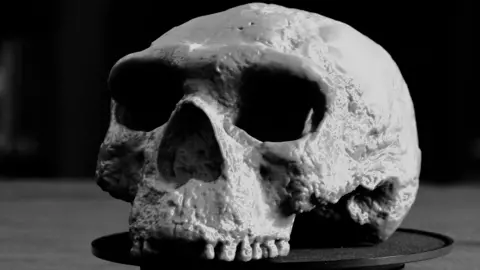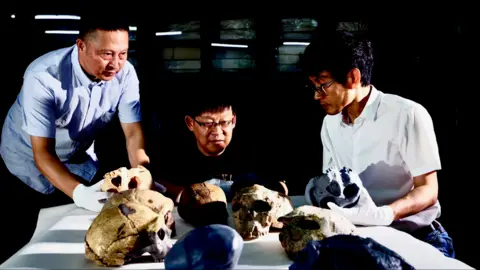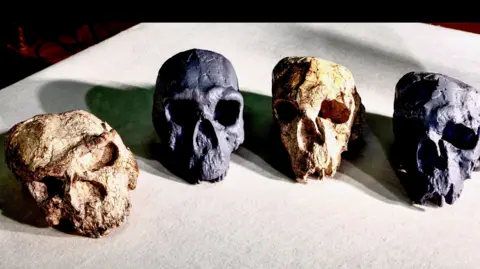Business
Former Arsenal striker dies after sustaining ‘significant injury’ during game

Read full article on post.
Chichester City FC and former Arsenal striker Billy Vigar has died after sustaining a “significant brain injury”.
Vigar, 21 and from Worthing, was injured during a game at Wingate and Finchley on Saturday in the Isthmian League Premier Division.
It is thought the injury was caused when he collided with a concrete wall, but the club has not confirmed this.
Vigar’s family said on Thursday they were “devastated that this has happened while he was playing the sport he loved”.
“After sustaining a significant brain injury last Saturday, Billy Vigar was put into an induced coma,” the family said.
“On Tuesday, he needed an operation to aid any chances of recovery. Although this helped, the injury proved too much for him and he passed away on Thursday morning.
“The responses to the original update show how much Billy was loved and thought of within the sport.”
Vigar was a graduate of the Arsenal academy and also had spells at Derby County, Hastings United and Eastbourne Borough.
Derby County said in a statement: “All at Derby County are deeply saddened by the passing of Billy Vigar.
“Billy spent the second half of the 2022-23 season with the academy on loan from Arsenal, making several appearances for the Under-21s.
“The thoughts of everyone at the club are with his family and friends at this incredibly difficult time.”
A spokesperson for Hastings said: “All of us at Hastings United are devastated to learn of the passing of Billy Vigar.
“We will always remember Billy’s time at Hastings United with fondness. Our thoughts are with Billy’s family [and] friends at this time.”
Vigar made 32 appearances for Eastbourne while on loan from Arsenal during the 2023-24 season.
Eastbourne said: “[We] are devastated to learn of the passing of former player Billy Vigar.
“Both footballing and non-footballing club staff are shocked and deeply saddened of the news, and our thoughts are with Billy’s family at this terrible time.”
The FA said in a statement: “We send our heartfelt condolences to his family, friends, loved ones and everyone at Chichester City FC at this incredibly difficult time.”
Breaking News
Irish Rail to remove gender titles from online train booking system

Read more on post .
People travelling on Irish Rail trains will no longer have to declare their gender when booking a seat online, the company has said.
The change is to come into effect in the coming months and follows feedback from the LGBTQ+ community on how gender is represented on Irish trains.
A survey was carried out by Irish Rail, in partnership with Belong To LGBTQ+ Youth Ireland, with a view to better understanding what mattered to these communities when travelling by train.
Sixty-eight adults took part, with more than half of the respondents identifying as gay, 27 per cent as bisexual, 12 per cent as lesbian, 16 per cent as transgender and 14 per cent as non-binary.
In response to the feedback from the survey, Irish Rail said it would remove all gender titles from its online booking system.
At present, passengers must select either Mr, Mrs or Ms as their title before entering their name when booking a ticket online. Now, they will just enter their name.
The survey was distributed on Irish Rail and Belong To online channels and was not run by an independent polling company.
As part of the survey, Irish Rail made a donation of €5,000 to the support group.
“This approach allowed Iarnród Éireann to gain meaningful insights into the experiences of LGBTQ+ rail users and directly contribute to the delivery of important services for the community,” an Irish Rail spokeswoman said.
Some 71 per cent of survey respondents said they feel safe most of the time as an LGBTQ+ person on public transport, with almost 40 per cent saying rail was more inclusive than other transport options.
More than one third of respondents said they had used trains to attend LGBTQ+ events such as Pride festivals.
Business
Million-year-old skull rewrites human evolution, scientists claim

Read more on post.
 BBC News
BBC NewsA million-year-old human skull found in China suggests that our species, Homo sapiens, began to emerge at least half a million years earlier than we thought, researchers are claiming in a new study.
It also shows that we co-existed with other sister species, including neanderthals, for much longer than we’ve come to believe, they say.
The scientists claim their analysis “totally changes” our understanding of human evolution and, if correct, it would certainly rewrite a key early chapter in our history.
But other experts in a field where disagreement over our emergence on the planet is rife, say that the new study’s conclusions are plausible but far from certain.
The discovery, published in one if the world’s leading scientific journals, Science, shocked the research team, which included scientists from a university in China and the UK’s Natural History Museum.
“From the very beginning, when we got the result, we thought it was unbelievable. How could that be so deep into the past?” said Prof Xijun Ni of Fudan University, who co-led the analysis.
“But we tested it again and again to test all the models, use all the methods, and we are now confident about the result, and we’re actually very excited.”
 Fudan University
Fudan UniversityWhen scientists found the skull, named Yunxian 2, they assumed it belonged to an earlier ancestor of ours, Homo erectus, the first large-brained humans. That’s because it dated back about a million years, long before more advanced humans were thought to have emerged.
Homo erectus eventually evolved and began to diverge 600,000 years ago into Neanderthals and our species – Homo sapiens.
But the new analysis of Yunxian 2, which has been reviewed by experts independent of the research team, suggests that it is not Homo erectus.
It is now thought to be an early version of Homo longi, a sister species at similar levels of development to neanderthals and Homo sapiens.
Genetic evidence suggests it existed alongside them, so if Yunxian 2 walked the Earth a million years ago, say the scientists, early versions of neanderthal and our own species probably did too.
This startling analysis has dramatically shifted the timeline of the evolution of large-brained humans back by at least half a million years, according to Prof Chris Stringer of the Natural History Museum, a co-lead on the research.
He said there are likely to be million year-old fossils of Homo sapiens somewhere on our planet – we just haven’t found them yet.
There are two ways to pinpoint the species of an early human and work out when it walked the Earth – analysing the shape of the skull and its genetic data. In the case of Yunxian 2 both methods were used, and each came to the same conclusion.
But other researchers, such as Dr Aylwyn Scally, an evolutionary geneticist at Cambridge University, say there are considerable uncertainties in both methods.
“One has to be particularly tentative about the the timing estimates, because those are very difficult to do, regardless of what evidence you’re looking at, be that genetic or fossil evidence,” he said.
“Even with the largest amount of genetic data, it is very difficult to place a time when these populations may have coexisted to within 100,000 years, or or even more.”
He added that while Profs Ni and Stringer’s conclusions were plausible, they were far from certain, and that more evidence was needed to be sure.
“That picture is still quite unclear to us, so if the conclusions of this research are supported by other analyses, ideally from some genetic data, then I think we would start to be increasingly confident about it,” he told BBC News.
The earliest known evidence for early Homo sapiens in Africa is 300,000 years ago, so it is tempting to conclude that our species might have evolved first in Asia.
But there is not enough evidence to be sure at this stage, according to Prof Stringer, because there are human fossils in Africa and Europe that are also a million years old that need to be incorporated into the analysis.
“There is some genetic evidence that points to the even earlier emergence of our species which may have recombined with our lineage, but this is not yet proven,” he told BBC News.
The earlier timeline means that the three species of humans co-existed on the planet for around 800,000 years, much longer than previously thought, perhaps interacting and interbreeding in that time.
 Fudan University
Fudan UniversityThe earlier emergence also helps make sense of dozens of human fossil remains dating from 800,000 years ago and 100,000 years ago that scientists have found hard to classify and find their place in the human family tree – the so-called “muddle in the middle”.
But the earlier emergence of Homo sapiens, Homo longi and Neanderthals neatly solves the problem. It means that is now possible to group the hard-to-classify fossils as subgroups belonging to one of the “big three,” or their more primitive ancestors, Asian Homo erectus and heidelbergensis, according to Prof Ni.
“Human evolution is like a tree,” he said. “This tree included several branches, and there were three major branches that are closely related, and they may have some interbreeding to each other, and they coexisted for almost 1 million years. So this is an unbelievable result.”
The skull was excavated along with two others from Hubei Province. But they were damaged and crushed, which is one of the reasons that Yunxian 2 had been miscategorised as erectus.
To restore them to their original shape, Prof Ni’s team scanned the skulls and undistorted them using computer modelling techniques and then printed replicas on a 3D printer.
Seeing them as they truly were enabled the scientists to reclassify them as a separate – more advanced group of human.
Business
Backlash from Labour MPs to Burnham leadership ambitions

This post was originally published on this site.
Matt ChorleyBBC Radio 5 Live and
Joshua Nevettpolitical reporter
Greater Manchester Mayor Andy Burnham is facing a backlash from dozens of Labour MPs over suggestions he could mount a challenge to Prime Minister Sir Keir Starmer’s leadership.
Burnham has criticised the Labour government in a series of interviews, and says he has been contacted by Labour MPs urging him to stand.
But the majority of Labour MPs who replied after being contacted by the BBC said they were against such a move.
Speaking to BBC North West, Sir Keir said he would not “get drawn into commenting on the personal ambitions of the mayor”.
He also sought to compare Burnham’s spending proposals with those of former Conservative prime minister Liz Truss, after the mayor complained about the government being “in hock” to investors in UK government debt.
BBC Radio 5 Live asked 320 out of the 399 Labour MPs currently sitting in Parliament for comment. Many of the dozens who replied were unhappy at the performance of the Labour government, but few suggested Burnham’s return would improve their fortunes.
One said Burnham “seems to promote himself every time there’s a perceived crack in the wall… a bit like Japanese knotweed” and a minister said a “few disgruntled MPs” made up “the Burnham fan club” and the rest just wanted him to “focus on his actual job in Manchester”.
In an interview with the BBC, Burnham said Labour MPs had been “in touch with me” to discuss the leadership, and urged the government to develop a “proper plan for the country”.
He has also given a series of interviews to newspapers, including with the Daily Telegraph, where he laid out plans for higher council tax on expensive homes in London and the South East.
He also called for £40bn of borrowing to build council houses, income tax cuts for lower earners, and a 50p rate for the highest-paid.
And in a profile in the New Statesman, he attacked ministers as being “in hock to the bond markets” – a reference to the government’s self-imposed rules limiting spending and borrowing.
Asked about Burnham’s claim that Labour MPs were urging him to stand for leader, Sir Keir told BBC North West: “I’m not going to get drawn into commenting on the personal ambitions of the mayor”.
He went on to add: “But I do want to be really clear about our fiscal rules, because economic stability is the foundation stone of this government.
“It was three years this week ago that we had the Liz Truss experiment where she abandoned fiscal rules in her case for tax cuts, and the result was a disaster for working people.
“The same would be true if you abandoned fiscal rules in favour of spending. And I’m not prepared to ever have that inflicted on working people again”.
There appears to be little appetite among Labour MPs for a change at the very top of government.
Some Labour MPs who spoke to the BBC were hostile to Burnham and said a leadership challenge so soon after last year’s general election would be damaging for the party.
One said it would be “madness” to get rid of the prime minister at this stage, while one minister branded Burnham’s comments “completely illogical and utterly self-indulgent”.
Others dismissed Burnham’s chances of returning to Westminster and said his flirtations with a leadership bid had been unhelpful for the party at a difficult time.
Some Labour MPs have gone public with their views on Burnham.
Markus Campbell-Savours, the Labour MP for Penrith and Solway, said Burnham would need to find a safe seat to come back to the House of Commons.
He said: “There are none. He won’t be in Parliament anytime soon. So if there really are colleagues who think he’s going to swoop in and save the day, they need to give their head a wobble.”
Sojan Joseph, the Labour MP for Ashford, said he “completely supported the prime minister and his vision for change”.
He said: “Andy Burnham is doing a very good job as mayor of Manchester and he is best placed to focus on that, rather than speculate on leadership ambitions.”
Some MPs, speaking off the record to the BBC, were supportive of Burnham.
‘Something different’
One veteran backbencher said: “It’s the worst kept secret in politics that Andy would love to be back in Parliament and of course he had his eyes laser focussed on the top job.”
He added that “many Labour MPs particularly those from outside the capital see Andy Burnham as the potential saviour of their own positions come the next election”.
Another backbencher said it was “good” that Burnham had “come out with some constructive ideas” – and another said the Manchester mayor “offers something different”.
“He is certainly offering a vision which is severely lacking at the minute,” added the MP.
Even though there does not appear to be a widespread appetite for a change in leadership, Labour MPs are worried about local and national elections in Wales, Scotland and England next year and the rise of Reform UK in opinion polls.
One minister acknowledged the elections would be tough and speculated that a leadership challenge before then may not be beyond the realms of possibility.
To challenge for the Labour leadership, Burnham would need to become an MP.
Many barriers would stand in the way if he decided to chart that course, not least the selection process to stand for a vacant seat.
If he made it to Parliament, Burnham would have to secure the backing of 80 Labour MPs to challenge Sir Keir for the leadership.
Sir Keir has been rocked by a series of scandals, including the resignation of former Deputy Prime Minister Angela Rayner and the forced departure of former US ambassador Lord Mandelson.
In the latest development, the PM’s director of communications Steph Driver has quit her role.
Sir Keir said she had been “a loyal and valued member” of his team for almost five years.
Driver is the third person in six months with the “director of communications” title to leave Downing Street.
-
Culture2 days ago
Taylor Swift’s new cinema outing generates more than €12million in just 24 hours
-
Politics2 days ago
European Parliament snubs Orbán with vote to shield Italian MEP from Hungarian arrest
-
Culture2 weeks ago
Life, loss, fame & family – the IFI Documentary Festival in focus
-
Health3 days ago
EU renews support for WHO’s Universal Health Coverage Partnership
-
Culture2 months ago
Fatal, flashy and indecent – the movies of Adrian Lyne revisited
-
Culture3 days ago
Twilight at 20: the many afterlives of Stephenie Meyer’s vampires
-
Environment6 days ago
Key oceans treaty crosses threshold to come into force
-
Culture1 week ago
Farewell, Sundance – how Robert Redford changed cinema forever













































